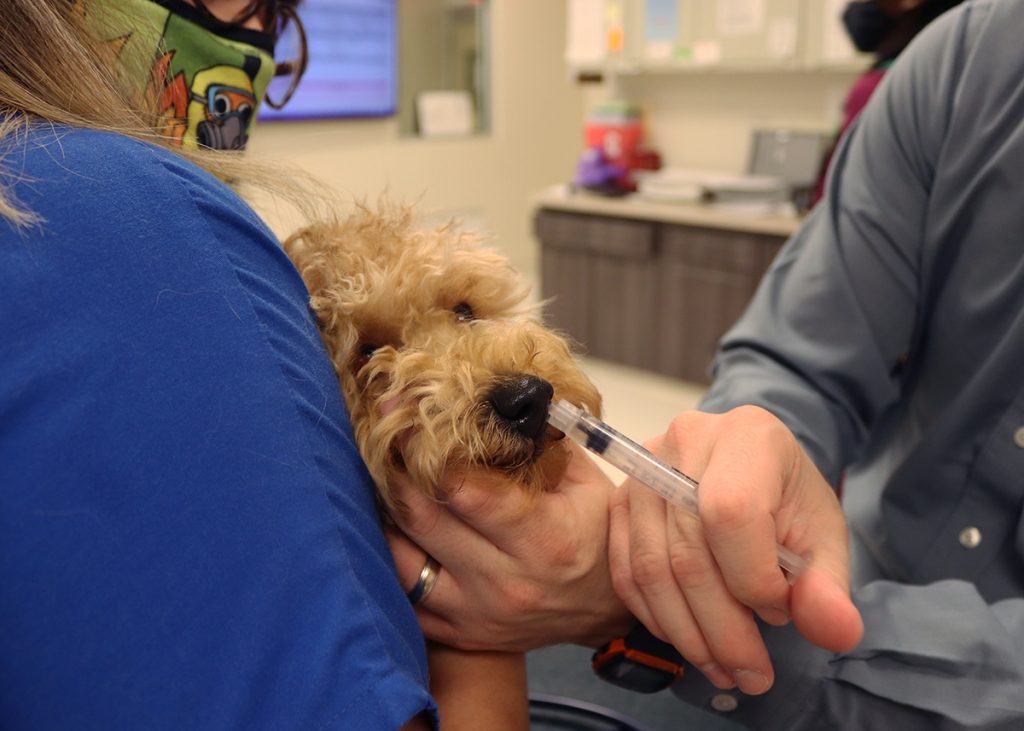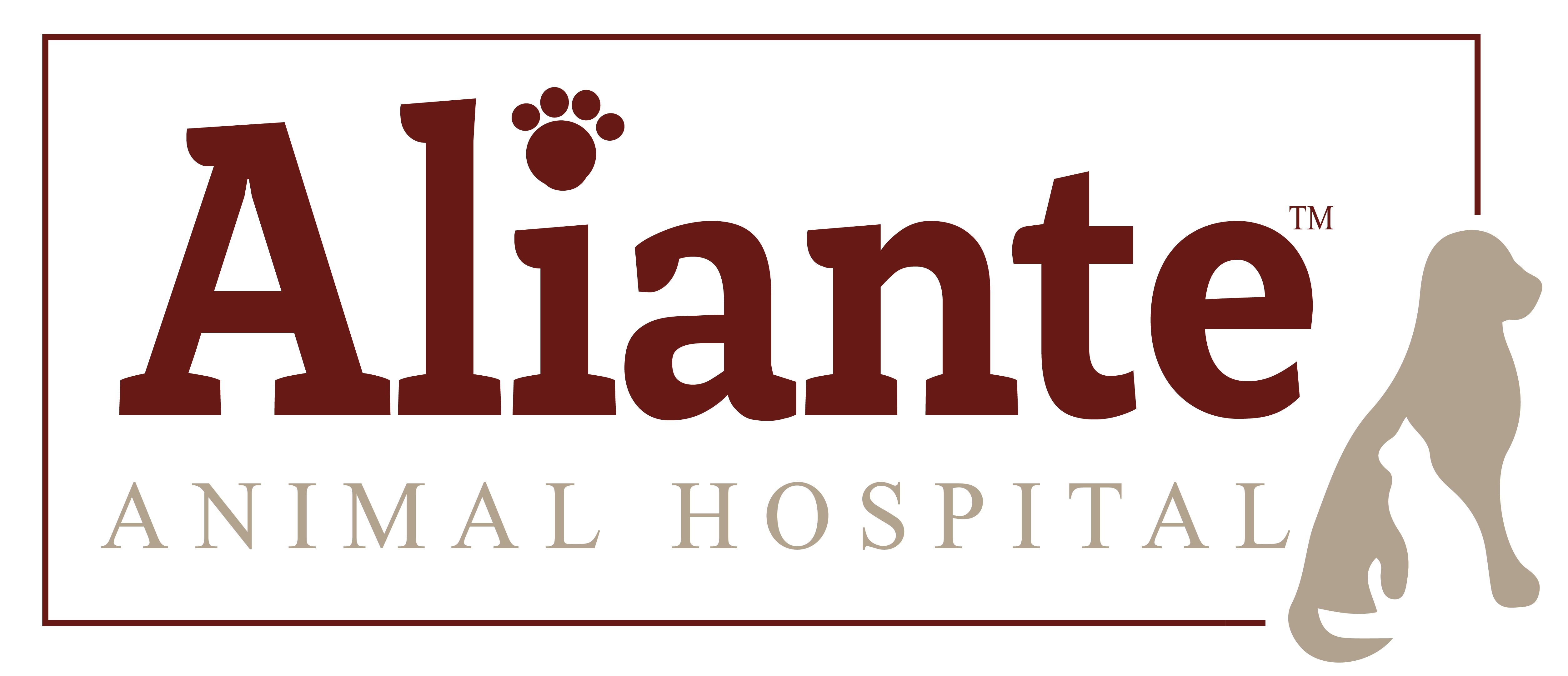
Wellness Exams are the most important part of your pet’s visit to our hospital. It is a comprehensive physical examination. During the wellness exam, our doctors spend time checking all your pet’s major systems including the heart, lungs, skin, and teeth for evidence of problems or signs of discomfort. Part of the assessment will include your pet’s lifestyle, age, breed, and health status to determine the appropriate vaccine schedule for your pet. Based on the wellness exam findings, the doctor will create an individualized preventative care plan for your pet that may include parasite control, heartworm prevention, routine dental cleanings, and nutrition recommendations.
Did you know that dogs and cats age seven times faster on average than people do, and significant health changes can occur in a short amount of time? Plus, the risks of cancer, diabetes, obesity, arthritis, heart disease, metabolic problems, and other serious conditions increase with age. These are the reasons why we recommend wellness exams for all pets twice a year.
Jump to Adult Canine Vaccine Schedule
Jump to Adult Feline Vaccine Schedule
Adult Canine Vaccine Schedule
Annual Canine Adult Vaccine Schedule
Jump to Alternatives to Routine Vaccination
Parvovirus Booster
Distemper Virus Booster
Parainfluenza Booster
Adenovirus Booster
Bordetella Booster
Rabies Vaccine every 3rd year
Heartworm Test
Intestinal Parasite Check
We recommend the Bordetella vaccine annually for dogs with lifestyles that include: Frequent grooming, boarding, and canine social activities including shopping, dog parks, and doggie daycare. Aliante Animal Hospital does not accept proof of immunizations from outside sources unless administered by a veterinary professional. Efficacy of immunization is questionable due to unknown storage and handling of the immunization product, timing, or administration technique. For each patient’s safety, Aliante Animal Hospital requires that all pets remain current on their core vaccines to enter the facility. This applies to all patients here for preventive procedures, boarding, and grooming.
Intestinal Parasite Control. Your pet may have intestinal parasites without you even knowing it. Intestinal parasites live in your pet’s intestinal tract and rob your pet of essential nutrients. The best way to detect intestinal parasites is to have your pet’s stool examined under a microscope to look for the microscopic eggs that are released in your pet’s stool. We recommend testing all puppies and kittens twice during their pediatric visits. It is best to collect your pet’s stool and bring it with you. The cost of an intestinal parasite test is $33.00.
To ensure your pet is parasite-free we recommend:
- Neonatal de-worming and intestinal parasite testing at each wellness visit
- Annual de-worming and intestinal parasite testing for all adult pets during their wellness visit
Heartworm Testing. Heartworm disease is becoming increasingly more common in Las Vegas due to the increase in lush landscapes, golf courses, and pools, which serve as breeding grounds for mosquitoes. Heartworm disease is a serious and potentially fatal disease caused by the parasite (Dirofilaria immitis), which is spread by the bite of an infected mosquito. Once your dog is bitten by a mosquito, the larva travels thru the bloodstream, to the right side of the dog’s heart and the large blood vessels going into the lungs. Once infected, it can take six to nine months for the larva to develop into the adult heartworm, with no signs of heartworm disease until an advanced disease is present.
To protect your pet we recommend:
- Annual heartworm testing
- Use of heartworm prevention year-round
- Ectoparasite control (flea/ticks/mosquito repellant) as needed for outbreaks and infestations, and for pets traveling outside of Las Vegas
Additional Canine Vaccines offered at Aliante Animal Hospital
Borrelia burgdorferi bacterin (Lyme Vaccine). Lyme vaccination is an optional vaccination for bacterial disease, Borrellia, which is transmitted by ticks. Ticks are present in Las Vegas that could possibly transmit Lyme disease, although the incidence is extremely low locally. Lyme vaccination is indicated in dogs that go hunting, fishing, camping, and hiking in wooded areas like Mount Charleston. Lyme disease can be transferred by a tick after feeding on a dog for just 24 hours. The use of tick adulticides and repellents may also be beneficial for pets that are in need of this vaccine. The Lyme disease vaccine is initially given with a booster in 3-4 weeks, then annually.
Leptospira Canicola-Grippotyphosa-Icterohemorrhagiae-Pomona bacterin. Leptospirosis is most common in moist, wet environments and therefore not a common disease in our desert area. This vaccine is commonly used for service dogs that will be exposed to various strains of Leptospirosis while working in the field. It is also recommended for dogs that will be fishing, camping, or hiking in wetlands. The Leptospirosis vaccine is initially given with a booster in 3-4 weeks, then annually.
Canine Influenza Vaccine is a respiratory disease that affects socially active dogs. CIV has two forms from different origins (CIV H3N2, avian origin & CIV H3N8, equine origin) vaccination against both strains is suggested. This vaccine has been clinically proven to reduce the severity of the canine “flu” virus. The initial Canine Influenza immunization series requires 2 vaccine doses given 2-4 weeks apart, then annually. Dr. Mych explains the dangers of canine influenza including symptoms and treatment.
Rattlesnake Vaccine. Vaccines stimulate an animal’s immune system to create antibodies that aid and defend against potentially harmful agents. The Rattlesnake Vaccine is intended to help create a strengthened immunity that will protect your dog against rattlesnake venoms life-threatening effects. Antibodies wear off over time so a booster shot is necessary once a year, or one month in advance of “snake season,” or twice per year in areas where snake bites are a year-round risk.
Alternatives to Routine Vaccination. In cases of geriatric, allergic, or chronically ill patients, the situation may arise in which the benefits of the vaccines no longer outweigh the potential side effects. In these cases, our veterinarian may discuss testing vaccination titers, which are blood tests that test for potential immunity against Canine Distemper Virus and Parvovirus. If the titers are sufficient then we accept them as proof of immunization. Not all facilities accept titers as proof of immunization. Titers are required to be performed at the same interval that regular vaccination is required. Vaccine titers do not exempt your pet from having a Rabies Virus vaccine.
Vaccine Reactions. Vaccine reactions occur because of the way an animal’s immune system reacts to the vaccine product. Vaccine reactions are not the result of the amount of vaccine injected or administration technique. If your pet does have a vaccine reaction treatment typically consists of injectable antihistamines, steroids, intravenous fluids, and occasionally epinephrine, at an additional cost to you. Some local vaccine reactions may take weeks to develop. If your pet has developed vaccine reactions in the past, we may recommend vaccine titers if applicable or pre-placement of an IV catheter, and pre-treatment with antihistamines.
Signs to watch for:
- Vomiting
- Diarrhea
- Facial Swelling
- Fever
- Not Eating or Drinking
- Decreased Activity
Canine Vaccination Schedule
View Puppy Vaccination Schedule
| Adult Dogs | Frequency | Price |
| Wellness Exam | ||
| Da2P (Distemper, Parainfluenza, Adenovirus) | 1 Year | $15.00 |
| Bordetella | 1 Year | $15.00 |
| Parvovirus | 1 Year; | $15.00 |
| Lyme | 1 Year | $41.00 |
| Rabies | 3 Years | $15.00 |
| Canine Influenza | 1 Year | $39.50 |
| Rattlesnake vaccine | 1 Year | $37.00 |
Adult Feline Vaccine Schedule
Annual Feline Vaccine Schedule
Rhinotracheitis Booster
Calicivirus Booster
Panleukopenia Booster
Feline Leukemia Booster
Rabies vaccine every 3rd year
Alternatives to Routine Vaccination. Feline vaccine titers are not done as frequently as in dogs but can be requested. It is important to understand that not all facilities accept titers as proof of immunization. Titers are required to be performed at the same interval that we would require the vaccination to be performed. Vaccine titers do not exempt your pet from having a Rabies Virus vaccine.
Vaccines Reactions. Vaccine reactions may also occur in cats. Any localized swelling at vaccine sites should be taken seriously in cats and should be promptly evaluated by one of our veterinarians. For cats with previous vaccine reactions, we routinely recommend vaccine titers if applicable and pre-placement of an IV catheter and pre-treatment with antihistamines.
Feline Vaccination Schedule
View Kitten Vaccination Schedule
| Adult Cats | Frequency | Price |
| Wellness Exam | ||
| ENT-FVRC (Rhinotracheitis, Calicivirus, Panleukopenia) | 1 Year | $15.00 |
| FeLV (Feline Leukemia – Based on Lifestyle) | 1 Year | $15.00 |
| Rabies | 3 Years | $15.00 |

